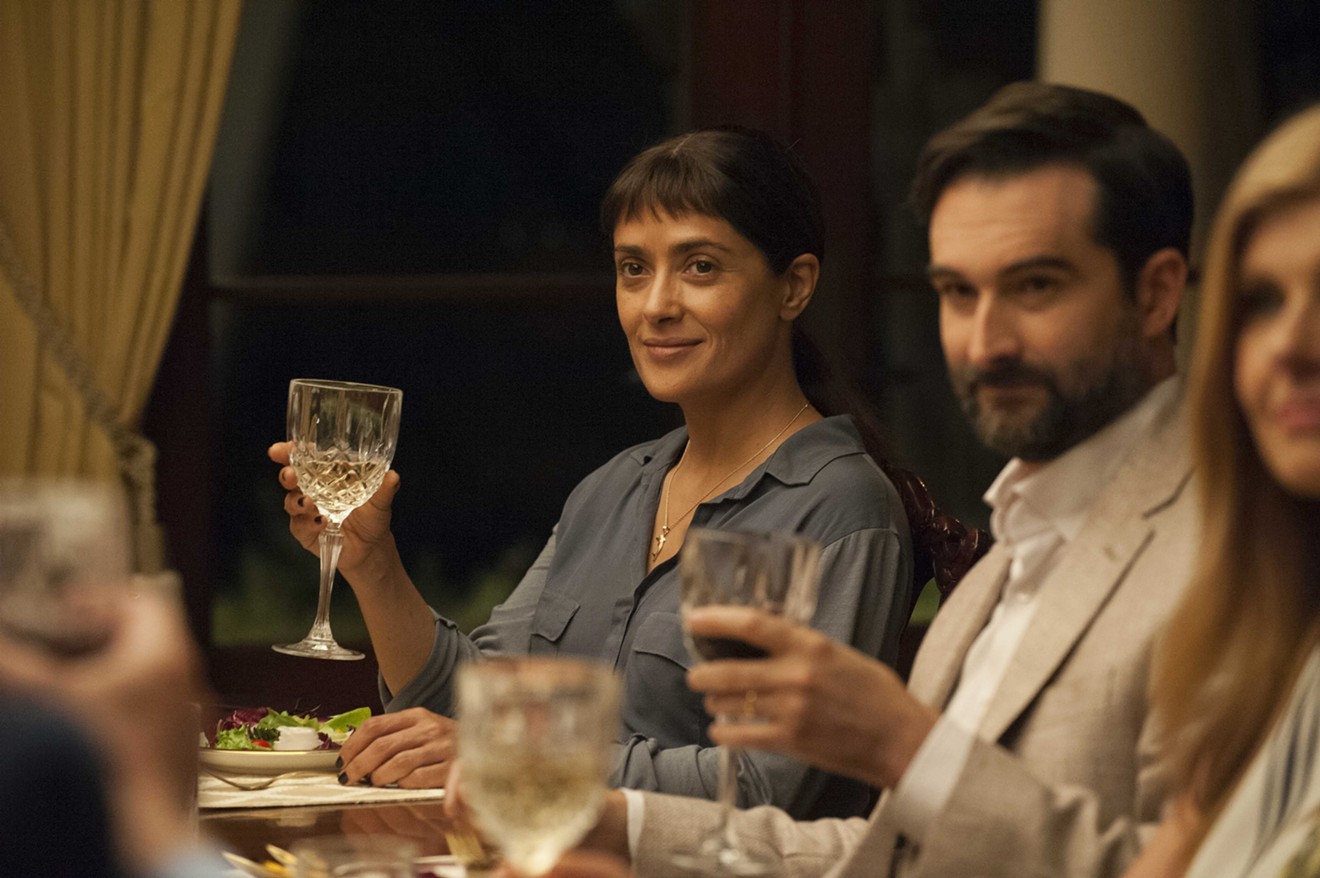A film often smartly attuned to language, Beatriz at Dinner — a sober comedy about class clash and soft-to-hard racism directed by Miguel Arteta and written by Mike White — operates in several different idioms. English and Spanish (sometimes unsubtitled) are spoken, as are the lexicons of healing and affluence specific to Southern California, which here are just as often dissonant with each other as they are consonant.
The first 10 or so minutes of this fleet, dialogue- and dialectic-heavy film, though, are mostly wordless, tracing the routine of Beatriz (Salma Hayek), a self-described health therapist who lives in Altadena with no humans but plenty of animals and religious symbols. Her menagerie includes dogs and goats; her syncretic faith, Buddha and the Virgin Mary. She works primarily in a cancer center, tending to the ill through massage. Beatriz also has private clients, including Kathy (Connie Britton), a Newport Beach matron who has requested an at-home rubdown before a business-related dinner party she and her husband, Grant (David Warshofsky), are hosting. After the session, the healer’s car won’t start, and Kathy insists she join their six-person supper.
“She’s not a housekeeper or anything — she’s a friend of the family,” Kathy pleads to Grant, who is reluctant to let khaki-clad Beatriz sit at the table with their soigné associates. That’s one of several blistering lines in Arteta’s film, efficiently revealing its speaker’s appalling caste system and presumptions of intimacy with a paid professional. As the two other white moneyed couples arrive — Alex (Jay Duplass) and Shannon (Chloë Sevigny), and Doug (John Lithgow) and Jeana (Amy Landecker) — Beatriz finds herself either patronizingly listened to by the wives or flat-out insulted by the husbands. Barely a minute after shaking her hand, Doug, the eldest and wealthiest of the diners, asks Beatriz the most obnoxious question leveled at those who speak accented English: “Where are you really from?”
Beatriz has a good comeback to his stupidity and will later confront this real estate tycoon by recalling some of her protest work against land developers in her native Mexico. But she is not a saint; much like Laura Dern’s Amy Jellicoe in White’s late, great TV show Enlightened, Beatriz, a person committed to doing good in the world, can be obtuse in reading social cues and fatiguingly sanctimonious, her wearisome traits finely calibrated by Hayek. Yet these nuances begin to harden into the Manichean in the final act, as Doug’s tales of big-game hunting and Beatriz’s responses to his boastful bloodlust become too thuddingly obvious a metaphor for their contrasting ethics. Their conflict leads to an incoherent resolution in an otherwise sharply elucidated film.
[
{
"name": "Air - MediumRectangle - Inline Content - Mobile Display Size",
"component": "18478561",
"insertPoint": "2",
"requiredCountToDisplay": "2"
},{
"name": "Editor Picks",
"component": "16759093",
"insertPoint": "4",
"requiredCountToDisplay": "1"
},{
"name": "Inline Links",
"component": "17980324",
"insertPoint": "8th",
"startingPoint": 8,
"requiredCountToDisplay": "7",
"maxInsertions": 25
},{
"name": "Air - MediumRectangle - Combo - Inline Content",
"component": "16759092",
"insertPoint": "8th",
"startingPoint": 8,
"requiredCountToDisplay": "7",
"maxInsertions": 25
},{
"name": "Inline Links",
"component": "17980324",
"insertPoint": "8th",
"startingPoint": 12,
"requiredCountToDisplay": "11",
"maxInsertions": 24
},{
"name": "Air - Leaderboard Tower - Combo - Inline Content",
"component": "16759094",
"insertPoint": "8th",
"startingPoint": 12,
"requiredCountToDisplay": "11",
"maxInsertions": 24
}
]











